10 conclusions from the 2021 UCI Road World Championships
A 100th anniversary filled with exciting Flandrien racing that most will long happily remember, but some may want to forget
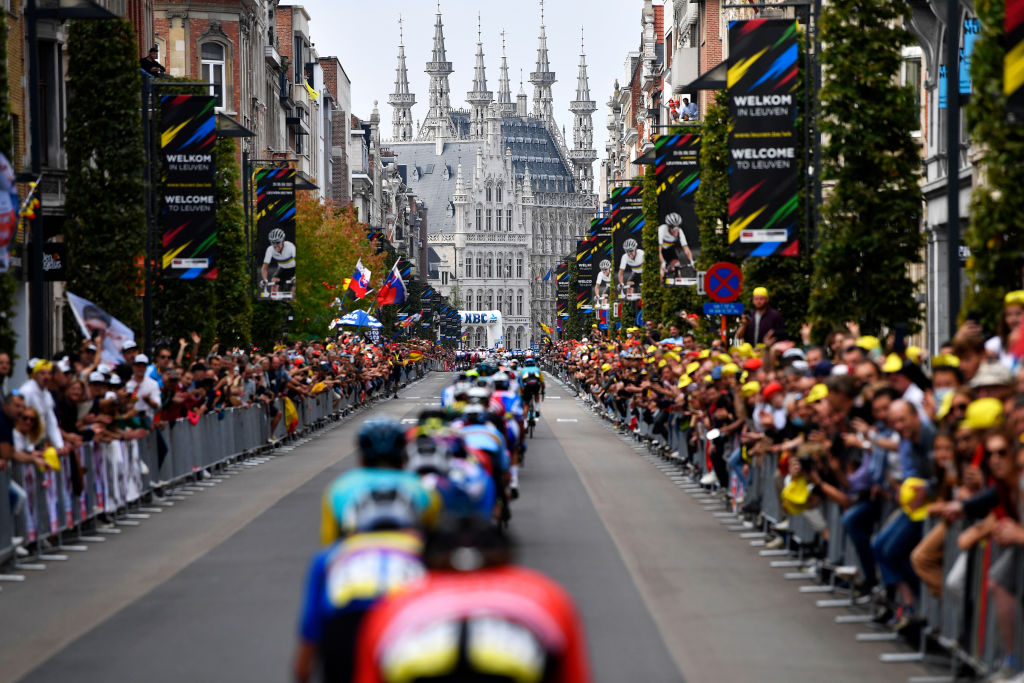
The week-long festival of cycling that is the UCI Road World Championships drew to a close on Sunday as a scintillating elite men's road race in Leuven wrapped up what has been an exciting and captivating 100th anniversary Championships.
Along the way there was joy for Italy and disappointment for the host nation. A series of fresh young riders made a name for themselves as old favourites returned – and bowed out. The massive crowds that lined the route electrified the atmosphere after well over a year of disrupted, largely spectator-free racing.
It was a Worlds to savour, and one that will live long in the memory.
Here we look back and analysed the week and the 11 races to understand what happened and why the Flanders 2021 World Championships were so special.
These are our 10 conclusions.
A disappointing homecoming for Belgium
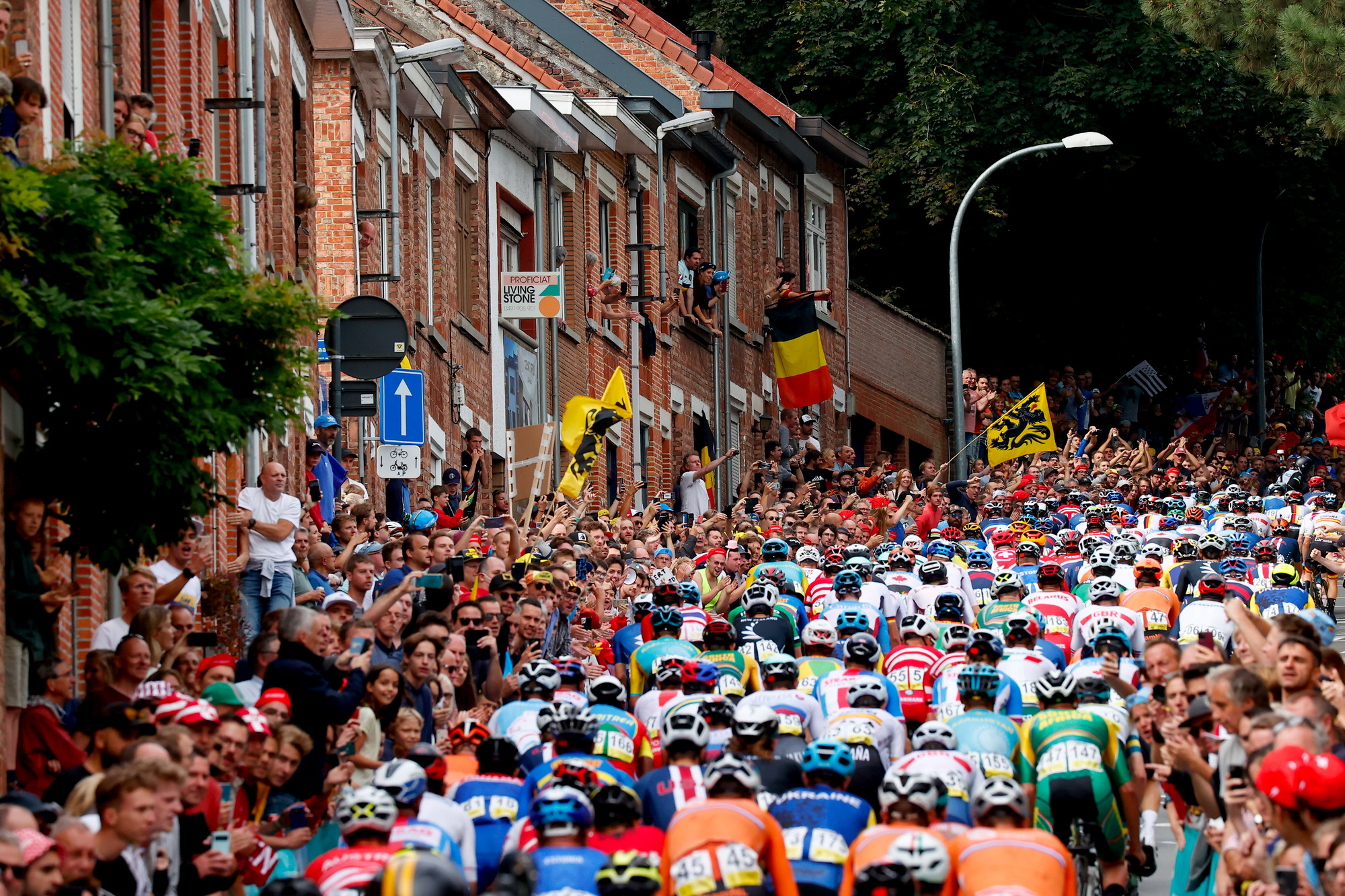
Whatever the home nation's ambitions for the week's racing, an outcome amounting to three bronze medals and a silver – none at all in the elite men's or women's road race – was certainly not what Belgium had hoped to take away from their first home World Championships in almost two decades.
Huge crowds turned out to pack the courses around Brugge and Leuven throughout the week, with an estimated one million people watching Sunday's action from the roadside, but rather than a glorious week packed with gold, Belgian supporters instead got something different.
The latest race content, interviews, features, reviews and expert buying guides, direct to your inbox!
European men's junior time trial champion, Alec Segaert, took bronze in the same event in Flanders, while race favourite, the much-hyped Cian Uijtdebroeks, couldn't recover from early crashes in the junior men's road race. The women juniors didn't take a top five, and it was the same story in the elite women's races, which saw Lotte Kopecky among the pre-road race favourites before her eventual 16th place finish.
Superstar Wout van Aert had kicked off the Worlds in promising fashion with a second place behind Filippo Ganna in the men's time trial, but the strong Belgian squad missed the medals in the closing men's road race, despite a star turn by Remco Evenepoel and Jasper Stuyven being part of the four-man chase group behind eventual winner Julian Alaphilippe in his hometown.
Van Aert, meanwhile, said he was "only human" having finished 11th after some onlookers had all but placed him in the rainbow jersey in the lead-up to the race.
"There’s two reasons we didn’t win: Alaphilippe was much stronger than the others and I wasn’t as good as I hoped I would be," he said.
The latter judgement could just as well sum up Belgium's entire Worlds campaign. (DO)
The mixed relay team time trial was a success
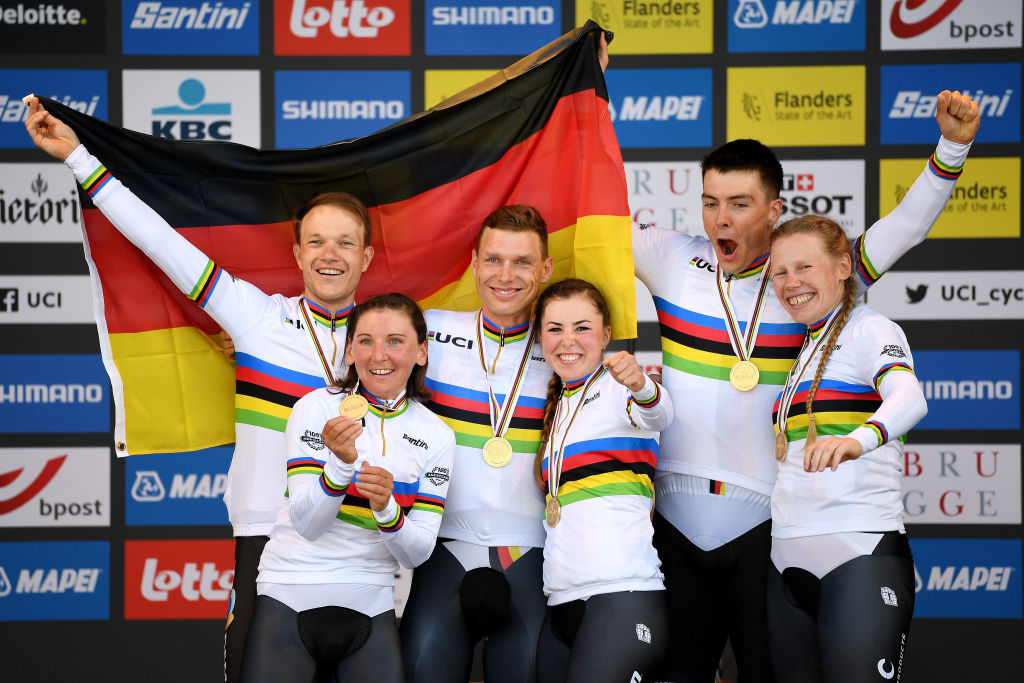
The mixed relay team time trial is the newest event at the World Championships, having been introduced as a replacement for the trade team's TTT two years ago.
It's fair to say the reception has been mixed, but the second edition of the race in Flanders provided moments of real drama and a send-off for one of the top time triallists in recent history.
Tony Martin signed off his 16-year career with a fourth rainbow jersey, as his five teammates Lisa Brennauer, Mieke Kröger, Lisa Klein, Nikias Arndt, and Max Walscheid also triumphed. Of course, the post-race reaction was centred on Martin, his teammates paying tribute with Brennauer saying "When we heard some days ago that this would be his last event, we promised him to make it a good one."
That may have been the main story of the day but it certainly wasn't the only one, with Italy pipping Switzerland to bronze on the bike throw of Marta Cavalli and Elisa Longo Borghini at the line. Five-hundredths of a second separated the two squads, as Filippo Ganna added his second medal of the Worlds, with the tight contest proving there was drama to be had outside of the 'main' events before and after.
This year also saw the mixed relay shift in the Worlds calendar, moved to take a spot after the individual time trial and drawing a higher quality field as a result with Ganna, Longo Borghini and Martin joined by Annemiek van Vleuten, Magnus Cort, Stefan Küng and TT gold medallist Ellen van Dijk.
It's a boost for the discipline, which is tipped for a future Olympic berth with the IOC seeking more mixed-gender competition. (DO)
Results beyond the page
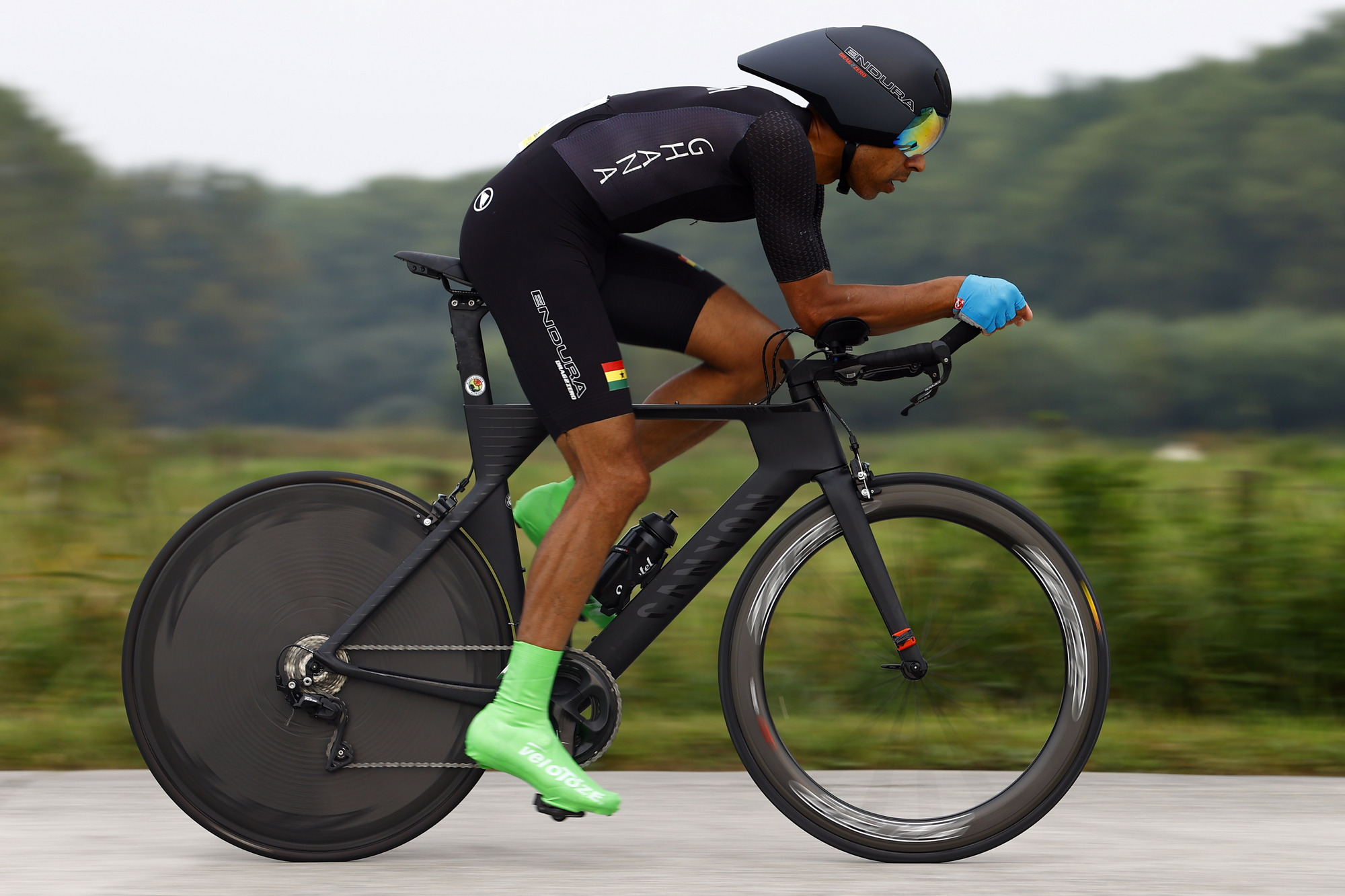
The World Championships represent the pinnacle of the sport – a week-long coronation of the world’s best bike riders. And yet, they’re also a celebration that goes beyond the results that end up on the page. Some of the biggest smiles came not from riders with medals around their necks but those who’d gone largely unnoticed.
A couple of highlights from these Worlds involved riders who finished last.
In the first case, Chris Symonds, a 47-year-old Ghanaian Londoner who rode the elite men’s time trial and has since done a full week’s work as a House of Commmons doorkeeper. Then Asthma Jan and Kanza Malik, who made history as the first Pakistani women to race internationally.
I found it disappointing to read comments questioning whether these riders were worthy of their places. Of course, you could have found 100 riders from, say, the Netherlands who would have beaten them. But that misses the point spectacularly.
We already have races where access is restricted to the very top echelon; it’s the Tour de France, the Giro Donne, and the whole professional calendar for the other 51 weeks of the year. This is the World Championships and the clue is in the name.
Besides, as Jan and Malik pointed out, their very presence could be the spark that inspires others, perhaps giving the next generations the opportunity to rise higher up that results sheet.
Some of these ‘losers’ have often won before they’ve finished their first pedal stroke, and their stories are among the most compelling on a human level. They are unquestionably worthy of their place at the World Championships and the event is all the better for them. (PF)
Dutch drama in the spotlight
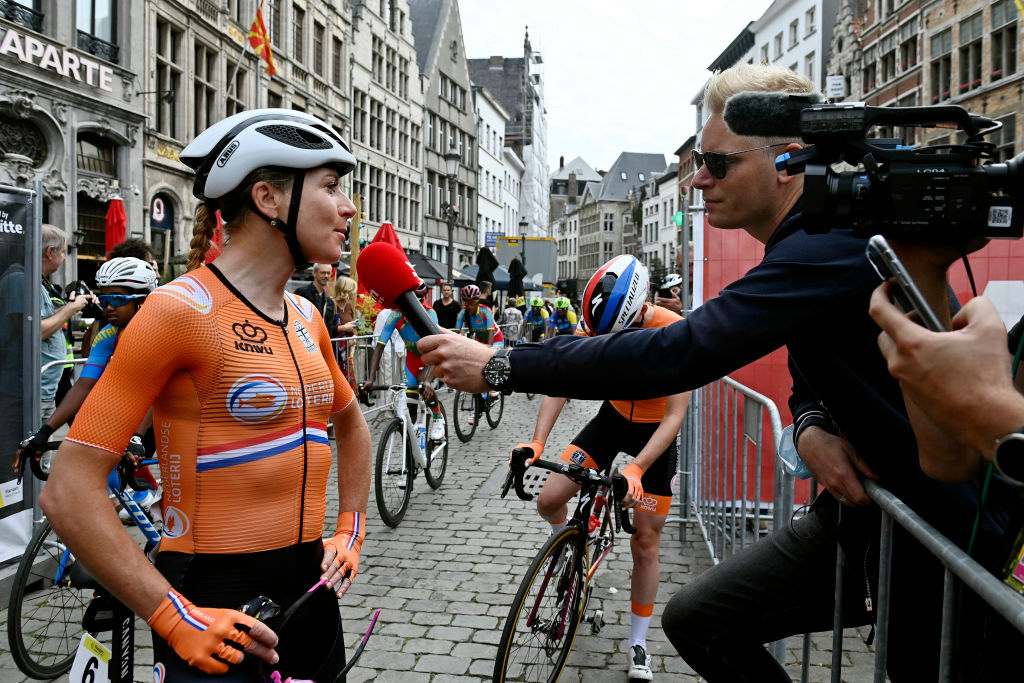
The Dutch riders who raced the elite women's road race at the World Championship likely woke up with a headache on Sunday morning. The replay of that lost sprint may well have been spinning through Marianne Vos’ head all night long.
The Italian lead-out blasted away and gapped the non-existing Dutch lead-out, forcing Vos to ride her sprint towards the wheel of Elisa Balsamo, having little left to pass her for the sprint to the line.
Vos burst into tears right after the finish, having come so close to a fourth world title on the road. Demi Vollering was also in tears, feeling guilty that she was unable to support the team in the way they expected her to do. Annemiek van Vleuten, Ellen van Dijk, Chantal van den Broek-Blaak and Lucinda Brand were all fuming about the rambling team tactics that had gone wrong.
Anna van der Breggen, however, wasn't sifting through the ashes post race. She worked hard early on during the final race of her career and if she ended up with a headache Sunday, a more likely cause was the champagne at the UCI gala of champions on Saturday night.
The internal troubles in Team NL at the 2021 World Championships in Leuven follow shortly after the dramatics at the Olympic road race in Tokyo last month.
Favourite Mathieu van der Poel didn’t realise a ramp in the cross-country course would be removed and crashed hard during the opening lap, ruling him out of contention for the medals. Both Team NL’s MTB-coach Gerben de Knegt and rider Milan Vader said he was informed it would be removed during competition. It was an unfortunate way to miss out on a medal. Just as unfortunate was the way Annemiek van Vleuten thought she had won the Olympic road race while Anna Kiesenhofer of Austria had already captured a solo victory a few moments earlier.
Clearly, there’s miscommunications causing unfortunate race situations and because the Dutch have so many good riders that puts their problems in the spotlight.
Is there a structural problem? Probably not.
Most of all, it seems as if the Dutch are creating some sort of trauma with these series of events. It’s a cloud that hangs over them. The Dutch football team ended up with a similar trauma when it comes down to taking penalties at the major championships like the World Cup. For some reason, it’s not happening at the championships, at least not this year. (BD)
Great Britain look to the next generation
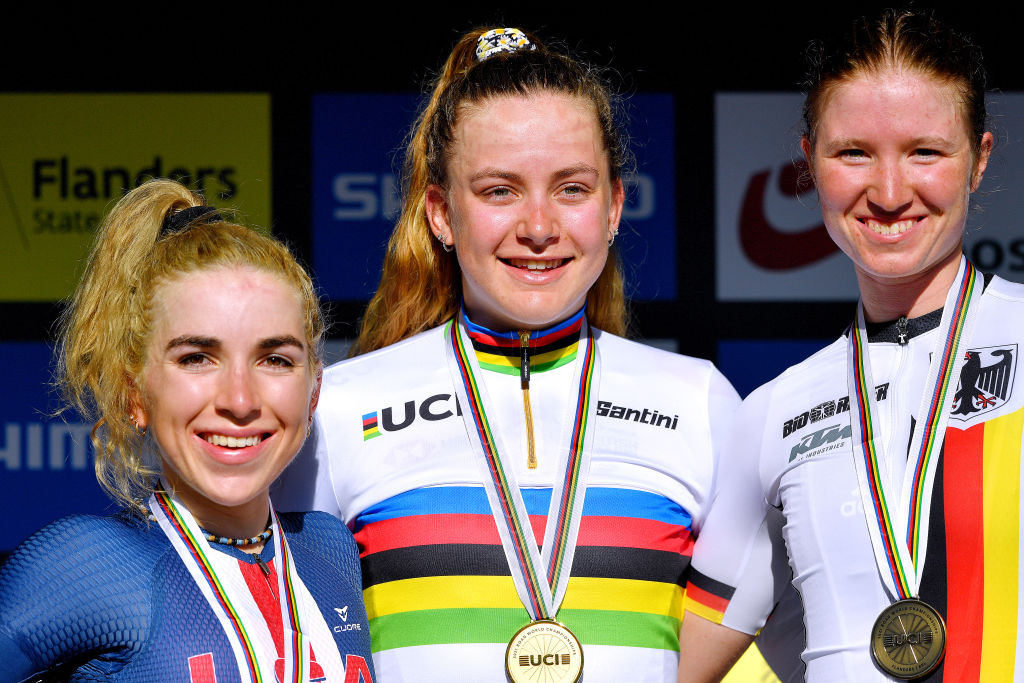
Before rocking up to Flanders, Great Britain's wait for a rainbow jersey stretched back to Lizzie Deignan's road race victory in Richmond back in 2015. 17-year-old Zoe Bäckstedt who ended the wait, winning a two-up sprint for junior women's road race victory on Saturday morning.
Her triumph, which followed a silver in the junior time trial, continued something of a theme for Great Britain this week, as the nation looked to the next generation of rider for success. As the likes of Chris Froome, Geraint Thomas and Mark Cavendish exit their prime years, a new crop of young talent is emerging.
The 17-year-old Josh Tarling followed up European track gold earlier this year with second place in the junior men's time trial, while in the elite women's races, 20-year-old Pfeiffer Georgi made her Worlds debut and 22-year-old Anna Henderson impressed with some attacking riding in the road race.
Lewis Askey – who turns pro with Groupama-FDJ next season – just missed the medals with a sprint to fifth place in the U23 men's road race.
On the final day, Tom Pidcock soloed to sixth at his first elite men's road race, having headed up a squad which included fellow youngsters Fred Wright, Ethan Hayter and Jake Stewart. One 'golden generation' may be winding down but it's clear that Britain has nothing to worry about in the future. (DO)
Italian masterclass in Flanders
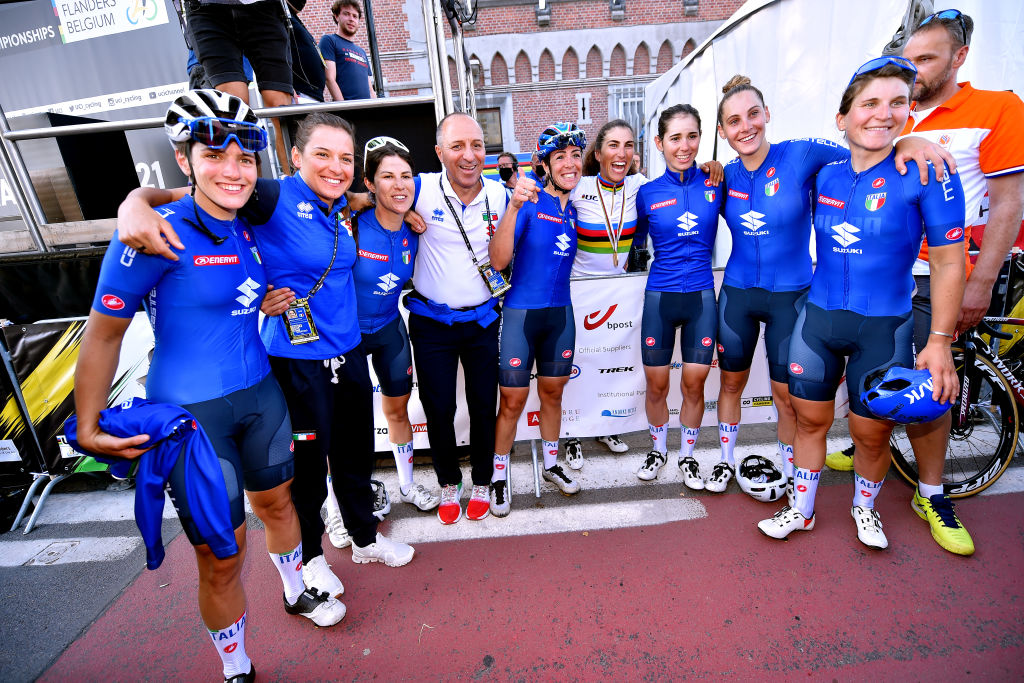
The Italian national team pride themselves in their preparations for the flagship World Championships, and while naming their selections might be delayed compared to other nations, it’s likely because they put very careful thought into hand-picking a team capable of working together to win a rainbow jersey.
The nation put forth the best performances of the week beginning with Filippo Ganna’s stunning effort to win the elite men’s individual time trial, which secured him a second consecutive world title ahead of Belgian favourites Wout van Aert and Remco Evenepoel.
The team went on to secure a bronze medal in the team time trial mixed relay. Lead by Ganna, along with Edoardo Affini and Matteo Sobrero, the men posted the fastest time of the opening leg. Although the women’s trio of Elisa Longo Borghini, Elena Cecchini and Marta Cavalli struggled to hold onto the gold medal position, they did enough to secure their nation the bronze medal.
In what was one of the best displays of teamwork all the week, Longo Borghini launched a supreme lead-out for her sprinter Elisa Balsamo to win the rainbow jersey in the elite women’s road race ahead of a scrambling and disjointed Dutch squad.
The Dutch came into the race as the favourites, but the Italians were not overlooked, as both nations fielded the strongest teams on paper. While the Dutch desperately attacked and tried to reduce the field in an attempt to set up their sprinter Marianne Vos, they left the three-time road race world champion without any support in the closing kilometre and she was forced to burn her matches trying to keep up with the Italians.
Italy was far better organised. Maria Giulia Confalonieri covered the late-race attacks with 1.5km to go, while Balsamo glued herself to the back of Longo Borghini and Marta Bastianelli. Longo Borghini made the decisive lead out for the squadra azzurra when she accelerated i the final 500 metres, Balsamo latched onto her back wheel, while a delayed reaction from Vos meant that she had to close the gap to the two Italians.
Longo Borghini looked back and Balsamo signalled with the shake of her head that she needed a few metres more of a lead-out before launching her searing sprint toward the finish line, so Longo Borghini kept going. Vos tried to pull up beside Balsamo in sight of the line but it was no use because she didn’t have the power and sat back down as Balsamo claimed the world title.
It was Italy's first world title for the elite women’s team since Giorgia Bronzini’s double wins in 2010 and 2011. (KF)
U23 crisis requires thought and leadership
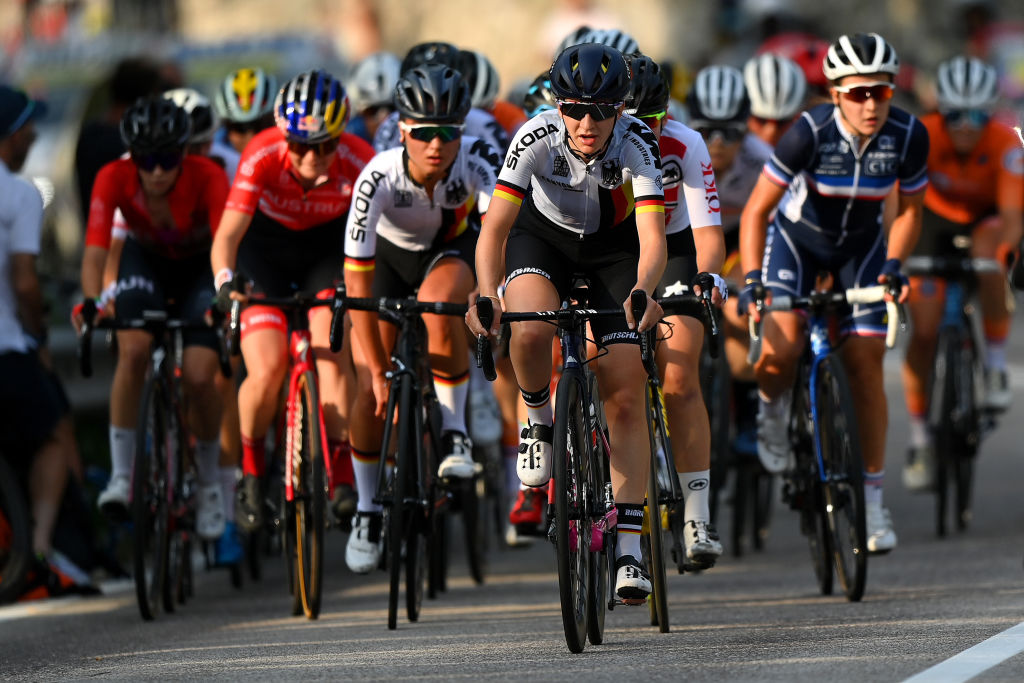
The future of the under 23 category was a major talking point during these World Championships. The UCI’s stalling on a women’s version has grown increasingly awkward while, somewhat ironically, the men’s version is looking increasingly unfit for purpose.
We asked UCI president David Lappartient about the issue and he suddenly confirmed that a U23 women’s champion will be crowned next year – but by mere virtue of being the top finisher in the elite race.
Although the format is used in some national championships, it feels like a half-baked idea and, to be frank, a stalling tactic. Lappartient indicated a U23 women’s race will come in the future and even said “at some point, you just have to go.”
So what is he waiting for?
Worse was to come. Lappartient spoke of a crammed schedule and financial constraints, even claiming that mayors won’t want to close their cities for an extra day.
That would be comical if it wasn’t so offensive. Beyond the basic principles of equality, there is legitimate debate surrounding the value of the U23 category. Women’s cycling is growing and, now more than ever, young riders arguably need that stepping stone between the junior and pro ranks.
By contrast, on the men’s side, the category has become dominated by riders who are already professional riders, leading Andre Greipel to accuse the UCI of “destroying your own U23 system”.
After all, the category in French is known as ‘espoirs’ - or ‘hopefuls’. Taking pros and especially WorldTour pro riders out of the equation would arguably be fairer but then it might damage the event.
The complex situation requires the UCI to reflect carefully on the best interests of young riders. (PF)
Flanders never fails
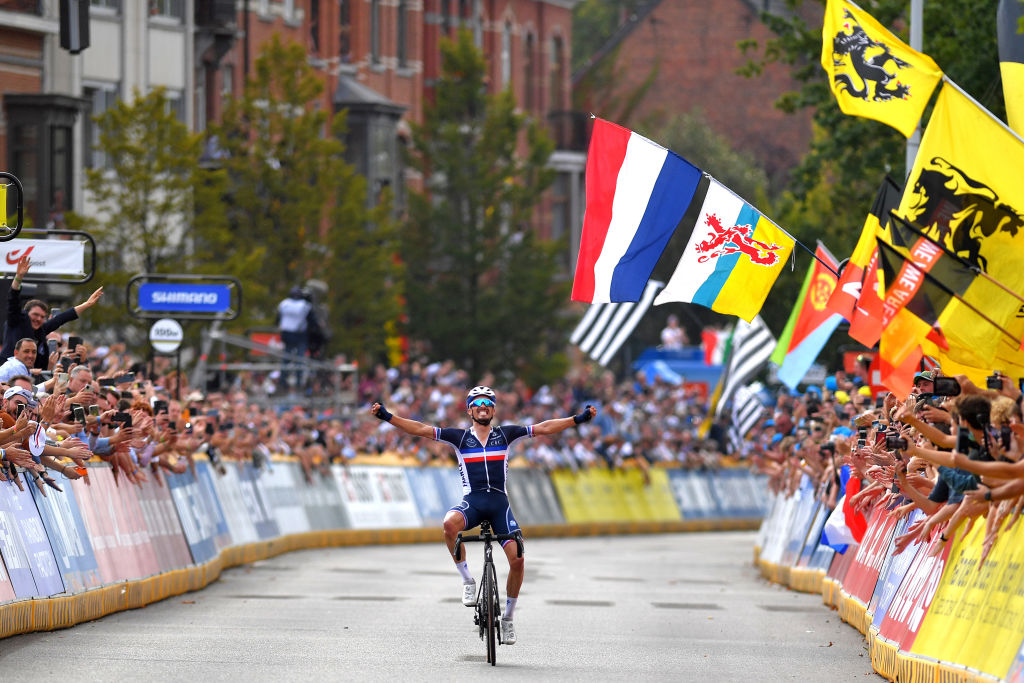
The 100th anniversary edition of the World Championships couldn’t take place just anywhere; they had to be somewhere that would tap into the history of the sport.
Flanders, the cycling-mad part of cycling-mad Belgium, turned out to be an inspired choice in the end. It wasn’t always so clear-cut.
The idea of a ‘Flanders Worlds’ automatically made you think of the Ronde van Vlaanderen, and battles for rainbow jerseys unfolding on the Muur van Geraardsbergen, Oude Kwaremont and the rest. This championships, however, was split between the flatlands to the north of Bruges, and the Flemish Brabant east of Brussels and near Walloniam more Brabantse Pijl territory than the Tour of Flanders.
What’s more, the road race courses appeared confused, flitting back and forth between two circuits. In the end, we had fast honest time trials and were treated to five entertaining road races, each one different to the last.
The elite women’s race was riveting, even if it lacked much definition, while the elite men’s was one of the most pulsating in a long time. Part of that was the fans - and one thing you couldn’t doubt about a Flanders Worlds was that it would be well attended.
Bruges was actually quite sleepy but the Worlds came to life in Leuven, reaching a crescendo by the weekend. The bars were full, the pintjes were flowing, and the noise was at times deafening. An atmosphere like that hasn’t been seen at a bike race in quite some time. (PF)
Girmay announces himself – and Eritrea – to the world
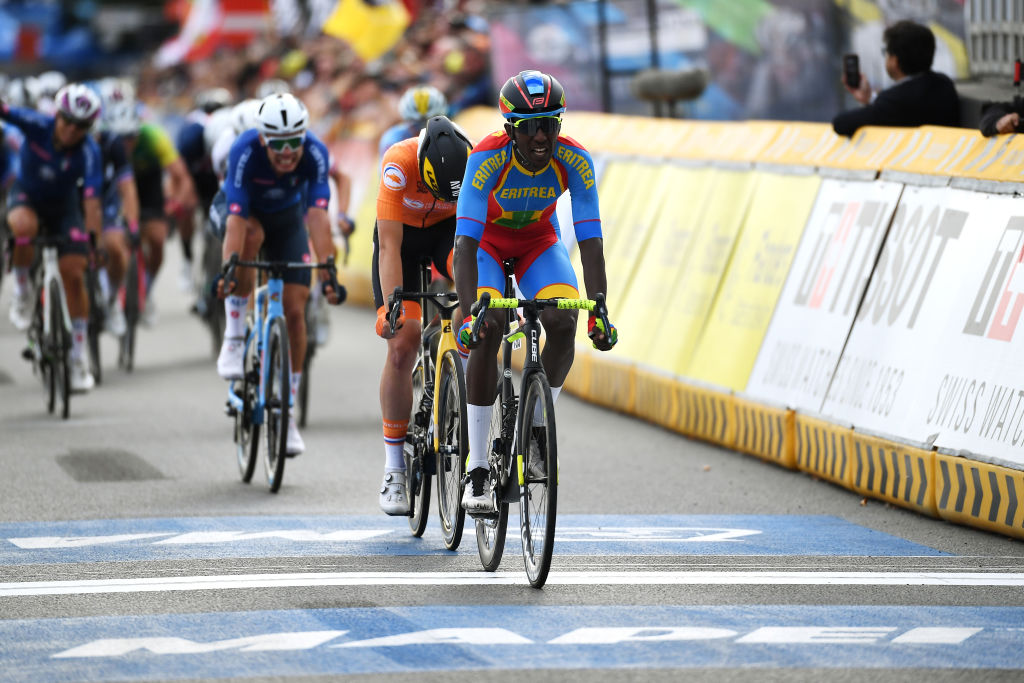
In Friday's U23 men's road race, 21-year-old Biniam Girmay made history as the first Black African to take a medal of any kind at a World Championships, finishing the 161.1-kilometre race in stunning fashion to sprint from 12th to second behind gold medallist Filippo Baroncini of Italy.
The Eritrean made the step-up to the WorldTour with Intermarché-Wanty-Gobert back in May, joining compatriots Natnael Berhane, Amanuel Gebreigzabhier, and Merhawi Kudus in cycling's top tier, while Henok Mulubrhan is set to move up to Qhubeka NextHash in 2022.
Mekseb Debesay and Daniel Teklehaimanot were trailblazers in the WorldTour back in 2016, but with Eritrea now taking hardware at an event at the level of the World Championships, Girmay could represent another step forwards for the country.
Girmay already impressed last year with second place at the Trofeo Laigueglia and fourth at the Giro della Toscana, while this season he has scored top 10 placings at seven semi-Classics plus a victory – ahead of Thibaut Pinot and Nairo Quintana – at the early September Classic Grand Besançon Doubs.
Girmay, who dedicated his silver to "all Eritreans and all Africans" is a prototypical puncheur still at the very start of his career. If you weren't already keeping an eye on him for the future, then it's time to start, because Girmay could be Eritrea's first major race-winning cyclist. (DO)
Alaphilippe the animator
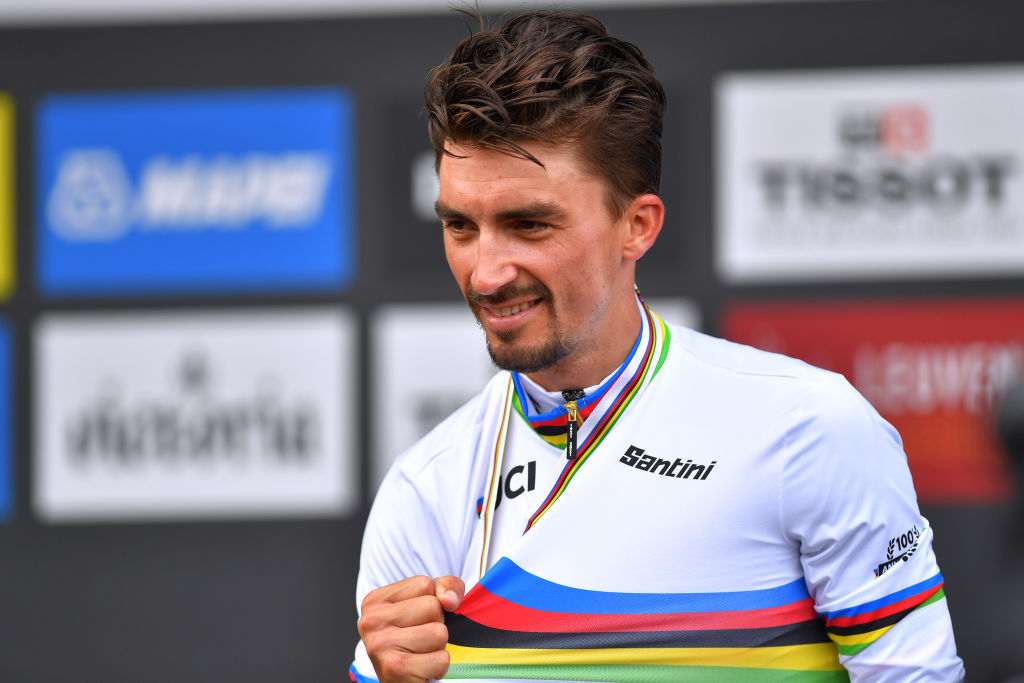
Julian Alaphilippe knows how to put on a show. In the midst of his lung-busting effort to stay solo on the final lap of a World Championship road race, he turned to the television camera motorbike and let us know just how deep he was going.
Solo in the final kilometre, he whipped up the roadside spectators, even if they’d have preferred to have seen home-nation rider Wout van Aert passing first. On the podium after pulling on his second rainbow jersey, Alaphilippe even lead the sea of Flandrien fans into a stirring rendition of the ‘Icelandic clap’.
Few riders get to be the actor that takes the starring role at a World Championships; Alaphilippe directs as well. After the mid-pandemic silence of his first title in Imola 12 months ago, here we had an atmosphere and sense of occasion to do justice to a rider who gets the heart racing like no other. And while the Belgians were always going to make noise, it was the Frenchman who provided them and us with the best Worlds road race, at least in my memory.
It had already been captivating before he first sprang from the saddle with almost 60km remaining, but he single-handedly lit up the race with at least five huge attacks. This was a rider who was completely unafraid to lose. In fact, as he revealed he expected and, perhaps even on some level, wanted to lose. He said the rainbow jersey had weighed heavily on his shoulders but here, in his first race without it, he was liberated, racing on pure instinct, passion, and panache.
No one puts as much emotional energy into riding a bike as Julian Alaphilippe, and that energy transmits through roadside barriers and television screens. We’re blessed with a new generation of superstars, and some of them may have regularly beaten Alaphilippe this season, but none seem to deliver such highly-charged and ultimately unforgettable moments.
Alaphilippe’s victory put him in the history books as the first Frenchman to win the Worlds twice and the 13th of any nationality to do so, but in my book his victory on Sunday will be remembered not for its statistical significance, but for the way it made you feel. (PF)

Dani Ostanek is Senior News Writer at Cyclingnews, having joined in 2017 as a freelance contributor and later being hired full-time. Before joining the team, she had written for numerous major publications in the cycling world, including CyclingWeekly and Rouleur. She writes and edits at Cyclingnews as well as running newsletter, social media, and how to watch campaigns.